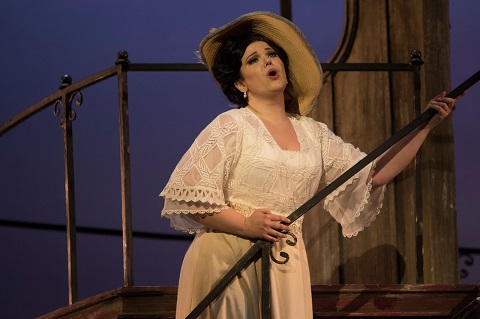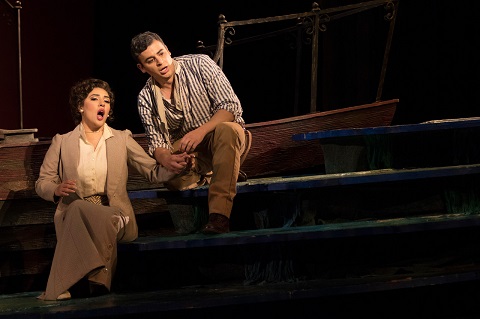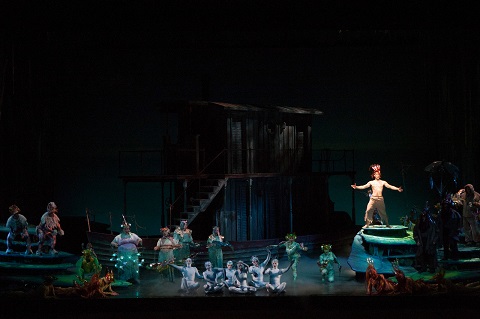25 Mar 2018
San Diego’s Ravishing Florencia
Daniel Catán’s widely celebrated opera, Florencia en el Amazonas received a top tier production at the wholly rejuvenated San Diego Opera company.

Daniel Catán’s widely celebrated opera, Florencia en el Amazonas received a top tier production at the wholly rejuvenated San Diego Opera company.
I had been hoping for years to catch up with a production of this acclaimed piece, but schedules have conflicted and life had intruded. Happily, I have made up for lost time, and the SDO mounting was so persuasive that I immediately vowed to seek out another performance of this masterwork at the earliest opportunity.
San Diego has long had a connection with the composer, having produced his Rappaccini’s Daughter (La hija de Rappaccini), the first work by a Mexican composer to be presented by a major opera house in the United States. The success of Rappaccini's Daughter brought Catán international attention, launching his musical career in the United States and sealing the commission of his next opera, Florencia en el Amazonas by the Houston Grand Opera .
In this local premiere, the piece was so lovingly mounted that it was clear the company was treating the work as the masterpiece it decidedly is. The lush score borrows stylistically from Puccini here, Debussy there, here a taste of Strauss, there a dash of Britten, but the unifying whole is peppered with Latin undertones and the voice is uniquely Catán’s.
Almost the entire plot unfolds on the deck of a ship sailing up the Amazon bound for Manaus. There, a legendary opera house awaits the return engagement of diva Florencia Grimaldi, performing a concert as she returns to her homeland to reunite with her lover Cristobal, a hunter of exotic butterflies. Her quest to rediscover her lover Cristobal is the whole driving force of the piece. Although she is traveling among other passengers in disguise, Florencia’s enigmatic persona drives the motivations of the other characters.
 Elaine Alvarez as Florencia Grimaldi. Photo credit: J. Katarzyna Woronowicz.
Elaine Alvarez as Florencia Grimaldi. Photo credit: J. Katarzyna Woronowicz.
The music making was superlative, starting with the vocals. In the title role, Elaine Alvarez made a stunning impression. Her pliable spinto soprano easily encompassed every demand of three wide-ranging arias. The rich, pulsing tone was absolutely even throughout the wide-ranging part, and her alluring vocal presence anchored the performance with a poised, polished musical presence. Ms. Alvarez made us abundantly aware of why the public was in awe of her towering talents.
Every bit her equal, María Fernanda Castillo was a luminous Rosalba, her plush lyric soprano soaring above the staff to provide many of the evening’s most goose bump inducing moments. Ms. Castillo’s substantial soprano is tinged with pure gold and her sympathetic phrasing endeared her to the spectators. As her partner in romance, dashing Daniel Montenegro (Arcadio) provided exceedingly poised singing in equal measure. Mr. Montenegro is not only an ingratiating lyric tenor, but also has a winning way with a high-lying, pulsing phrase that made a fine impression. As the two love interests, the pair provided one of the evening’s highlights with a rhapsodic Act II duet.
 Maria Fernanda Castillo as Rosalba and Daniel Montenegro was Arcadio. Photo credit: J. Katarzyna Woronowicz.
Maria Fernanda Castillo as Rosalba and Daniel Montenegro was Arcadio. Photo credit: J. Katarzyna Woronowicz.
Luis Alejandro Orozco was a galvanizing presence as Riolobo. Part narrator, part demigod, Mr. Orozo’s imposing baritone was a potent presence, and his shirtless strutting provided handsome eye candy for the opera glasses crowd.
As the bickering, dyspeptic married couple, Levi Hernandez (Alvaro) and Adriana Zabala (Paula) were alternately amusing, annoying, and ultimately, touching. Mr. Hernandez has a beefy baritone that communicates securely and sympathetically.
Ms. Zabala’s rather barbed opening pronouncements eventually morphed into some mellifluous phrases infused with deference and luminosity. Hector Vásquez was a solid presence as the stolid Capitán, his seasoned baritone ringing out with honesty and clarity. Chorus Master Bruce Stasyna’s well-schooled ensemble not only sang with glowing tone and dramatic fire, but also cleanly executed some inventive staging while doing it.
Conductor Joseph Mechavich worked wonders with the orchestra, mastering every harmonic surge and eliciting finely tuned detail from the pit. Maestro Mechavich also skillfully wed singers, dancers and instrumentalists into a seamless ensemble. He controlled the arc of the piece with refined skill, all the while he somehow magically made the outpouring of melodies and effects feel exuberantly spontaneous.
 Luis Alejandro Orozco as Riolobo is joined by the San Diego Opera Chorus. Photo credit: J. Katarzyna Woronowicz.
Luis Alejandro Orozco as Riolobo is joined by the San Diego Opera Chorus. Photo credit: J. Katarzyna Woronowicz.
The handsome physical production originated at Indiana University, but seemed a perfect fit for the resources of the Civic Theatre. A forty-two-foot, double-decker riverboat dominates the stage as part of Mark Frederic Smith’s masterful set design. It begins at a pier in the opera’s first scene, with a boathouse structure framing the action. However, as the craft soon sets sail on the murky Amazon, the house flies away, and lush foliage droops artistically around the action.
The effect never becomes tiresome since the ship rotates on a turntable to reveal different, detailed perspectives of its construction. When the ship beaches in the storm, terraced riverbanks swing into place down left and right, and up right, which afford mystical river creatures to gambol and pose with enigmatic abandon.
Those “creatures” (aka the chorus and corps de ballet) were lavishly costumed by Linda Piano, who seems to have limitless imagination. The masks, fanciful accessories, painted body stockings and footwear were meticulously coordinated, and were complemented marvelously by Steven W. Bryant’s wacky, winning wig and make-up design. Ms. Piano also created lovely, character specific period wear for the diva Florencia, upper and lower-class guests, and laborers, greatly helping to define the relationships.
Todd Hensley’s brooding, ever-changing lighting design perfectly captured the emotional shifts in the plot, as well as the climate changes on the river. His choices of color filters were especially apt. Only two effects might have been improved upon: the storm lightning was tracked to look too predictable, and the overall threat of the turbulent storm (as heard in the music) was not realized with enough abandon. And the climactic moment of Florencia transforming into a butterfly went for too little. The unfurling of the costume, creating two wings, was a great start, but the rotating star gobo was a far cry from the coup de theatre that was called for. Think Defying Gravity, Wicked’s Act One closer, where the main character soars up to the wings as the black cloth of her cape spreads to fill the entire backdrop around her, and you get some idea of the jaw-dropping effect that might be needed.
Still, director/choreographer Candace Evans worked wonders with her resources, achieving moments that were beautifully judged for character revelations and dramatic insights. Ms. Evans deployed her assemblage of spirits with aplomb, creating a fine diversity of groupings and movement without ever creating a distraction. Indeed, she instilled a keen sense of dramatic focus was one the productions strong suits.
From the downbeat and the start of the engaging musical effects, to the ascendant metamorphosis that rang the curtain down, this was one memorable river journey I wished would never end.
James Sohre
Daniel Catán: Florencia en el Amazonas
Florencia Grimaldi: Elaine Alvarez; Rosalba: María Fernanda Castillo; Riolobo: Luis Alejandro Orozco; Arcadio: Daniel Montenegro; Capitán: Hector Vásquez; Alvaro: Levi Hernandez; Paula: Adriana Zabala; Sailor: Bernardo Bermudez; Conductor: Joseph Mechavich; Director/Choreographer: Candace Evans; Set Design: Mark Frederic Smith; Lighting Design: Todd Hensley; Costume Design: Linda Piano; Wig and Make-up Design: Steven W. Bryant; Chorus Master: Bruce Stasyna.